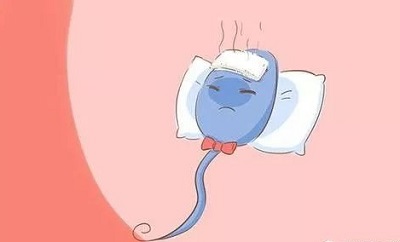Does Seminal Vesiculitis Cause Low Sperm Vitality?
Seminal vesiculitis is mainly caused by bacterial invasion of patients’ seminal vesicle glands, leading to seminal vesicle infection and inflammation. Patients may experience painful ejaculation, discharge of pink semen, and semen with blood shots and clots. If nottreated immediately, it will affect men’s sperm quality, resulting in low sperm vitality.

Reasons for low sperm vitality caused by seminal vesiculitis:
1. Seminal vesiculitis will change the composition of semen. For example, seminal vesiculitis caused by pathogenic microorganism infection will bring bacteria into the seminal plasma, which will consume nutrients in the seminal plasma and produce metabolic wastes and toxins that can lead to the decline of sperm vitality.
2. Seminal vesiculitis will reduce the pH of seminal plasma, resulting in a decline in sperm vitality and an increase in acidic substances that will reduce sperm vitality and worsen the situation.
3. Seminal vesiculitis will increase the viscosity of semen, resulting in difficulty liquefying. Decreased sperm vitality is mainly linked to the reduction of the liquefaction enzyme in semen.
4. Seminal vesiculitis can lead to abnormal sperm density. It can also lead to abnormal secretion of seminal plasma, such as increased or decreased secretion, affecting the overall sperm density and the patient's reproductive function.
How to improve sperm vitality?
1. Antioxidant therapy. Taking antioxidants such as vitamins C and E can reduce oxidative stress damage in the spermatogenic system and change the patient's fertility. At the same time, taking oral L-carnitine can increase energy in transporting sperm, thus improving sperm vitality. Food rich in lycopene is a natural antioxidant that can help improve the concentration, vitality, and shape of the sperm.
2. Use α receptor blockers to improve the microenvironment of the testis and promote motility and internal environment of the seminiferous tubules in the testis to enhance the quality of sperm.
3. Supply food containing zinc. Studies show that men who take 5 milligrams of folic acid and 66 milligrams of zinc sulfate daily increase their sperm count by nearly 75 percent after 26 weeks. Folic acid and zinc sulfate are essential for the formation of DNA.
4. Supply food containing L-spermidine, such as meat, fish, nuts, etc. When L-spermidine enters the body, it is converted to nitric acid, which dilates blood vessels, improves circulation, accelerates groin circulation, promotes sperm health, and increases sperm vitality.
Points for attention:
1. Avoid wearing tight pants. Tight pants can raise the temperature of the scrotum, which can interfere with seminal vesiculitis.
2. Maintain a proper body temperature. Increased scrotal temperature can affect sperm production. Avoid using hot water when showering and sitting for long periods.
3. Cut down on alcohol. Heavy drinking can cause hormone imbalances, reducing the quantity and quality of sperm.
4. Don't smoke. Smoking reduces sperm count, slows sperm movement, and causes abnormal sperm shape. Men who want to conceive must quit smoking.
5. Avoid drugs that affect the quality of your sperm. Long-term use of kidney-tonifying and aphrodisiac drugs can reduce sperm vitality, resulting in chromosome abnormalities or sperm malformation. If a pregnancy is planned, the husband should stop taking the medication three months before.
6. Lose weight. Studies have shown that sperm concentration drops by 26 percent when body mass index (BMI) exceeds 25.
7. Exercise more. Exercise improves blood circulation and improves sperm vitality.
8. Abstain from sex. Abstinence for 2-7 days results in optimal sperm quality.
Recommended Readings:
Can Seminal Vesiculitis Cause Excessive Semen Volume?
Do not Panic about Seminal Vesiculitis Attack! Some Nursing Methods in Life Can Help!
Seminal Vesiculitis Symptoms: 3 Symptoms Are Common But Hurt Health



